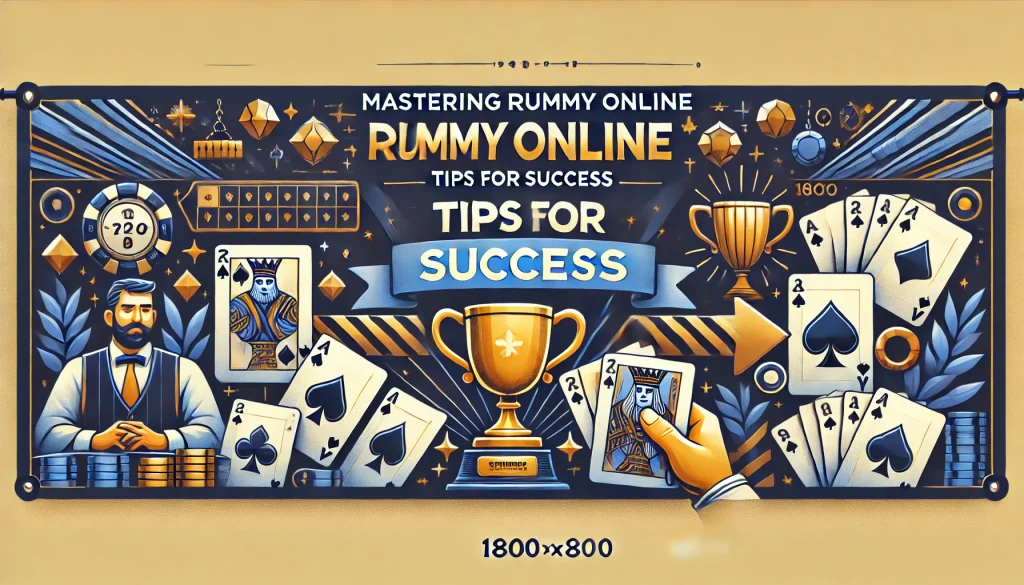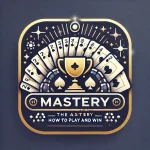Description

Learning Rummy: An All-Inclusive Guide Rummy is a traditional card game that has enthralled players for many years. It is favored by both serious competitors and casual players due to its unique combination of skill, strategy, & a dash of luck. In addition to knowing the rules, a player must cultivate a strategic mindset, practice frequently, and pick up tips from more seasoned players if they want to succeed at Rummy. This post will explore the key components of learning Rummy and offer advice and strategies to improve your skills. It is essential to have a firm understanding of the Rummy rules before delving into the nuances of strategy and gameplay.
A standard deck of 52 cards is used in the game, which usually has two to six players. Forming sets and runs—combinations of cards that satisfy particular requirementsis the goal. A run is made up of three or more consecutive cards of the same suit, whereas a set is made up of three or four cards of the same rank but different suits. Any player who wants to raise their game must comprehend these basic ideas. In addition to the fundamental rules, players should become acquainted with the various Rummy variations, as each one may have its own set of rules & scoring guidelines.
Gin Rummy, Indian Rummy, and Kalooki, for example, each have subtleties that can greatly affect gameplay. Understanding these variances improves a player’s comprehension of the game overall & enables them to modify their tactics appropriately. By understanding the rules, players can concentrate on honing their tactics and abilities without being distracted by misunderstandings or confusion while playing.
The next stage is to develop a strategic mindset after you have a solid grasp of the guidelines. Rummy is more than just a game of luck; it takes strategy and foresight. Gamers have to continuously assess their hands, taking into account both the cards their opponents might be gathering and their own possible melds. This entails monitoring what your opponents are discarding and picking up in addition to determining the worth of your own cards. You can learn a lot about their tactics and modify your own gameplay as a result.
Recognizing when to play conservatively and when to be aggressive is another aspect of cultivating a strategic mindset. For example, it might be prudent to play aggressively by discarding high-value cards that could help your opponents if you have a strong hand with several possible melds. In contrast, it might be more beneficial to take a more cautious approach and hold onto cards that might eventually form melds if your hand is weak. The secret to learning Rummy is striking a balance between aggression & caution, which frequently makes the difference between winning and losing.
To get better at Rummy, you must practice frequently, just like you would with any skill-based game. You get more accustomed to different strategies & tactics that can improve your performance the more you play. Playing games often enables you to try out various strategies, grow from your errors, and hone your decision-making abilities. Consistent practice strengthens your grasp of the game and boosts your confidence as a player, whether you’re playing online or with friends. Regular practice also exposes you to the range of tactics and playing styles used by various opponents.
Every player has a different style of play, which can teach important lessons about flexibility and adaptability. Seeing how other players play can help you spot successful tactics that you might want to use in your own approach. Your knowledge of rummy is expanded by this experience, which also gets you ready for any unforeseen situations that might come up when playing competitively. Learning from seasoned players is one of the best methods to advance your rummy skills.
Whether through informal discussions or formal instruction, learning from people who are experts in the game can yield priceless information that speeds up your learning process. You can navigate challenging situations & steer clear of common pitfalls with the help of the many strategies and tips that seasoned players frequently have to offer. Also, watching them play can reveal sophisticated strategies that less seasoned players might not notice right away.
Consider joining local clubs or online forums devoted to rummy in addition to speaking with experienced players face-to-face. These communities frequently offer chances for mentorship, experience sharing, and strategy discussions. Interacting with other players enables you to get different viewpoints on the game, ask questions, and get advice. You can develop relationships with players who share your interests and improve your knowledge of the game by immersing yourself in a community of ardent Rummy fans. In the current digital era, rummy enthusiasts can find a wealth of online resources to help them hone their skills.
Websites devoted to card games frequently offer forums, strategy manuals, and tutorials where players can talk about different facets of Rummy. Beginners trying to grasp the basics or seasoned players looking to improve their tactics can both benefit greatly from these resources. Playing against players from around the globe is another opportunity that online platforms provide, offering a variety of challenges and playing styles.
Players can also improve their skills without the pressure of competition thanks to the tutorials and practice modes offered by numerous online rummy platforms. These features give you the freedom to try out various tactics without taking any chances, which helps you gain confidence before going into more competitive situations. Also, skilled players’ live streams or instructional videos can offer visual examples of sophisticated tactics and strategies in action. These internet resources can help you improve your gameplay and gain a deeper understanding of Rummy.
Creating a Gaming Activity Budget. In competitive situations where stakes may be involved, managing one’s bankroll effectively is essential to playing rummy. You can avoid overspending or losing more money than you can afford by setting a budget for your gaming activities.
Because of this financial self-control, you can enjoy the game without worrying about money. monitoring victories and defeats. Establishing limits on the amount you are willing to bet during each session is a good idea, and you should adhere to them whether you are winning or losing. It’s crucial to monitor your gains and losses over time in addition to establishing spending limits. You can find trends in your gameplay and determine whether your tactics are working by recording your performance.
cutting down on financial risks. It might be time to change your strategy or ask more seasoned players for advice if you are losing money on a regular basis. Effective bankroll management will minimize financial risks while maintaining the enjoyment of your rummy experience. The game of rummy can be quite stressful at times, with pressure and high stakes. Making wise choices and carrying out successful plans during these crucial times require maintaining composure.
Remaining composed in the face of difficult circumstances, like an opponent discarding a card you need or holding onto valuable cards, enables you to think clearly & prevent rash decisions that can endanger your chances of winning. The ability to maintain composure under pressure can be developed by engaging in mindfulness exercises. Deep breathing and visualization are two strategies that can help you focus & feel less anxious when playing video games. Also, taking a mental and emotional reset during the breaks in between games or sessions can be beneficial. Maintaining composure will help you successfully negotiate the intricacies of Rummy and make wise strategic choices.
In the end, having fun while playing rummy is one of the most crucial elements. Although competition can be thrilling, it’s important to keep in mind that Rummy is a game meant to be enjoyable—a means of bonding with loved ones while completing a difficult mental exercise. By adopting this perspective, you can approach every game with excitement rather than anxiety or pressure.
Enjoying the game also promotes a positive outlook on winning & losing. As a player, you can develop personally by learning from your mistakes and celebrating wins with humility. The social component of rummy is enhanced when players joke around with opponents or laugh at unexpected gameplay turns, which makes it better for everyone. By emphasizing both skill development & enjoyment, you will develop a lifelong love for this classic card game.
In summary, learning Rummy necessitates a well-rounded strategy that includes knowing the rules, honing strategic thinking, practicing frequently, picking up tips from others, using internet resources, handling money sensibly, remaining composed under duress, and, most importantly, having fun with the game. Players can improve their abilities and enjoy the many benefits of mastering this well-liked card game by adhering to these guidelines.


